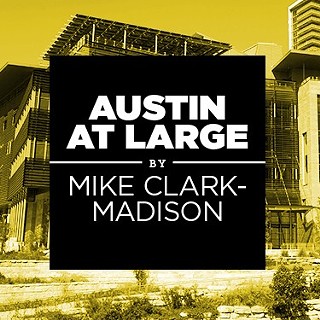Austin at Large: A Strong-Mayor Sweet Spot?
Advocates throw some salt on the pleasant-tasting “pro-democracy” reform plan
By Mike Clark-Madison, Fri., Jan. 1, 2021
The latest petition drive to ask Austin voters to amend the city charter – not Save Austin Now's reborn effort to re-up the ban on public camping (that is, on visible homelessness), or the sputtery push to recall the mayor – is from the good-government campaign calling itself Austinites for Progressive Reform. Its four-proposal package is pitched as a way to "make Austin the most pro-democracy city in the country," at the vanguard of pushback against Texas' dismal legacy of voter suppression and disenfranchisement. The most substantive of these measures would make Austin a strong-mayor city, like Houston (and New York, Chicago, etc.) but unlike other big Texas cities, where the mayor is like the president, the Council is like Congress, and the city manager is just a staffer. That end state has caused concern, as summed up in a letter sent in mid-December to APR's leader, Andrew Allison, from, among others, local labor leaders (led by AFSCME Local 1624, the municipal employees union) and justice reform advocates on the city's Reimagining Public Safety Task Force. The letter asks Allison to pull the plug on APR's drive, saying that the 10-1 council as it has existed since 2014 has "produced significant, tangible results on behalf of Austin residents," including the pro-labor and de-policing measures toward which its signatories have invested substantial toil and treasure.
"If passed, your amendment would reward these efforts and hard-earned results by hollowing out the Council's power and transferring it to a single, unknown person in 2022," they write, meaning the to-be-elected strong mayor. "We are unconvinced ... that the system proposed would have produced the achievements that the 10-1 council has."
Allison, who's been shepherding this effort since last summer amid the noise of the 2020 election cycle, wrote back promptly to express his regrets. After detailing APR's civic engagement over the last six months – a blue-ribbon steering committee, 17 public meetings in October, and then securing more than 20,000 signatures in "just 22 days" – he says it's basically out of his hands, although APR has yet to submit its sigs to the city clerk. "This campaign belongs to Austin now," he writes. "Those of us with access or privilege are not entitled to dispense with that process before the voters have a chance to weigh in."
Allison goes on to make counterarguments and pitch APR's package as actually strengthening 10-1; his response is several times longer than the original letter, and its points are also laid out on the APR website at www.austinprogress.org. It's a well-packaged effort that's projecting much confidence; the steering committee is a diverse group of real players in Austin politics (including noted allies of current Mayor Steve Adler but also opponents), and while it hasn't yet had to file a campaign finance report (its first is due Jan. 15), it has a professional campaign team that's won plenty of elections before. The city hasn't held a May election since 10-1, and if APR has in fact secured enough signatures, it would probably be the only thing on the ballot.
Like Vita-Meata-Vega-Min
I think it's fair to say that APR's three other reform proposals are sweeteners to get Austin to swallow its strong-mayor medicine. One would move the mayoral election to higher-turnout presidential years, which, sure. Its current alignment with the gubernatorial midterm is an artifact of when 10-1 was adopted in November 2012, with no greater intent. The second institutes ranked-choice voting, replacing low-turnout run-offs such as we just had, which would be great and indeed more democratic. (It probably wouldn't have saved Jimmy Flannigan, but it would have spared Alison Alter much agita.) But RCV, and most any other alternative vote system you may fancy, is not permissible under state law, so until that changes there's no urgency. (And yes, the particular limits in current statute have racist origins.)
The third is a public financing system of "Democracy Dollars," a voucher system where each registered voter would be able to earmark $25 to a candidate in each Council race. While running against "big money" is a venerable tradition in Austin politics, past electorates have rejected using tax dollars to support candidates; the current limited system, which many candidates opt out of, draws funds from lobbyist registrations, which is intended to make a statement. In practice, though Austin has a lot of registered voters, $25 isn't much money, and the APR proposal requires candidates to clear a nontrivial threshold of signatures and contributions to show they're legit. So this is more of a fun, symbolic treat, not a major rethinking of Austin's already austere campaign finance environment.
Strong-mayor, though, would absolutely turn City Hall upside down, and activists are right to worry that voters might adopt it as part of a pleasant-tasting goo-goo reform effort without thinking about its implications. That doesn't mean we shouldn't consider it; if APR has made it onto the ballot, we have time between now and May to dive deeper. The effort already scrambles the solidarity of Austin's progressive leadership – for example, there are members of the APR steering committee who also signed the union letter – and Allison's pitch all along has been that we should talk through the issues like adults and friends. Let's do that.
Got something to say? The Chronicle welcomes opinion pieces on any topic from the community. Submit yours now at austinchronicle.com/opinion.







